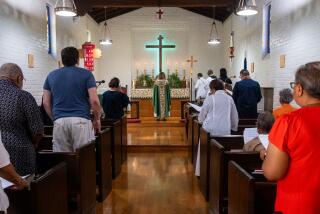Readers React: ‘Nones’ don’t need religious dogma to forge social bonds or explore their spirituality
To the editor: Referring to those who are religiously unaffiliated as “nones” is dismissive and demeaning. Millennials and others rejecting traditional religion do so because religious institutions have not met their spiritual needs.
Op-ed article writer Stephen Asma states that forging social bonds is “the very point of religion.” Really? While social connection and community service are wonderful goals, there are many other ways to attain these. Volunteer opportunities and social groups of all kinds are available everywhere.
As a baby boomer, I have been religiously unaffiliated most of my adult life. This is not about “magical thinking,” but about the freedom to explore life’s big questions without the constraints of dogma, rituals and social pressure.
Kathy Welsh, Claremont
..
To the editor: Without a question, “nones” do lose out on social bonding and many benefits by not pursing religious community. However, there is an exception — religious “institutionalism.”
Although no movement can survive without organizational structure, some religious organizations unfortunately reach a state of institutionalism whereby the priority of the organization focuses on its forms, structures and rituals rather than Jesus and his people. If this occurs, social bonding and its many personal benefits have as much chance of happening as finding Elvis. The natural consequences are impersonal relationships, a lack of communication and a disconnect between people.
Happily, many churches have learned their lesson, put aside organization for “organism,” and created structures to enhance social bonding.
Wesley Stalnaker, Valencia
The writer is a retired professor of theology and ministry.
..
To the editor: The move from “nuns” to “nones” has been ongoing for quite a while.
Besides the recent history of various sectors of the Christian movement showing their hypocrisy, the primary reason for this move is the natural conflict between science and the biblical version of the world.
When Charles Darwin’s theory of evolution is totally denied by some fundamentalist Christians, young people who are more aware of modern scientific advances will reject their religious affiliations and then question the rest of the story.
Roy Fassel, Los Angeles
Follow the Opinion section on Twitter @latimesopinion and Facebook
More to Read
A cure for the common opinion
Get thought-provoking perspectives with our weekly newsletter.
You may occasionally receive promotional content from the Los Angeles Times.






